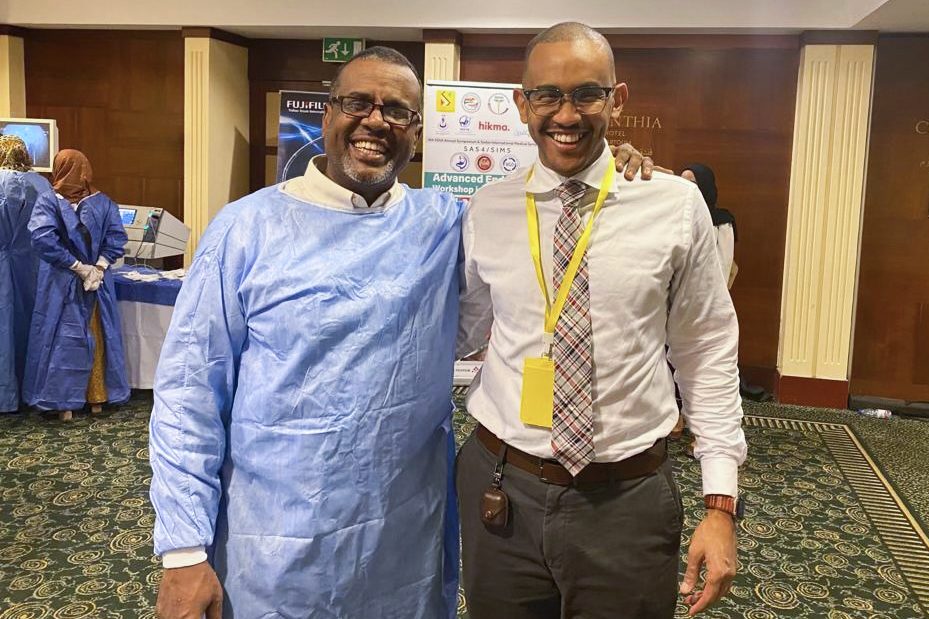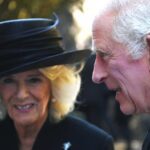Global Courant 2023-04-30 22:09:11
WASHINGTON (AP) — Tied to Sudan by ailing parents and his dedication to treating the poor there, American physician Bushra Ibnauf Sulieman continued to work as long as he could afterward fighting engulfed Sudan’s capital.
Days after fighting broke out in Khartoum on April 15 between two rival Sudanese commanders, Sulieman, 49, tended to the city’s wounded. He and other doctors ventured outside as explosions shook the walls of houses The people of Khartoum shrank. Gunfire between the two factions vying for control echoed in the streets.
“Say, ‘Nothing shall befall us except what God has ordained for us,'” Sulieman, a US-born gastroenterologist who split his time and work between Iowa City, Iowa, and Khartoum, said in one of his latest messages to worried friends on Facebook last week as fighting continued. “And in God let the believers put their trust.”
The morning Sulieman decided he had to make the perilous escape from Sudan’s capital with his parents, his American wife and his two American children, was the morning the war found Sulieman, friends say.
In the massive looting that accompanied fighting in the capital, Khartoum, a city of 5 million people, a roving band of strangers surrounded him in his garden on Tuesday and stabbed him to death in front of his family. Friends suspect robbery was the motive. He became one of two Americans killed in the fighting in Sudan, both holding dual citizenship.
Authorities say the other, with ties to Denver, was caught in a crossfire. They have not released the name of that American.
Mohamed Eisa, a Sudanese physician working in the Pittsburgh area, was a close colleague of Sulieman. Over the years, “I sometimes asked him, ‘Bushra, what are you doing here? What are you doing in Sudan?’, Eisa remembers.
“He always says to me, ‘Mohamed, listen – yes, I like living in the United States … but the American health care system is very strong,’ and a doctor more or less won’t make a difference.
Story continues
Eisa said Sulieman would tell him, “In Sudan, everything I do has such an impact on so many lives, so many students and so many medical professionals.”
Due to the sudden illness and death of Eisa’s father in Khartoum, Eisa was in Sudan when the fighting broke out. As he tries to return to his American wife and children in the US, Eisa spoke late last week from Port Sudan, a Red Sea city now crowded with Sudanese and foreigners making the perilous 500-mile drive from the capital. the hope of securing a spot on ships leaving Sudan.
Eisa described a journey through checkpoints manned by armed men, past bodies lying in the street, and past vehicles carrying other families who died trying to escape.
After evacuating all US diplomats and other US government personnel on April 22, the US executed her first evacuation of US citizens Saturday. It used armed drones to escort buses carrying between 200 and 300 US citizens, permanent residents and others to Port Sudan.
Sudanese in their country and in the US spoke of Sulieman’s murder as a special loss.
He was a respected colleague at the gastroenterology clinic and Mercy Hospital in Iowa City, said hospital director Tom Clancy. Sulieman’s older children live in Iowa.
He traveled back to Sudan several times a year with medical supplies he had collected for that country, colleagues said.
A nurse at the Iowa City clinic who refused to be identified because the nurse was not authorized to speak called him one of the best. “His love for his patients was over the top,” said the nurse. Colleagues considered him a powerhouse and humanitarian, a cheerful man with an infectious laugh who populated his texts with smileys and cats in sunglasses.
In Sudan, Sulieman led the medical school at the University of Khartoum and was founder and director of a humanitarian group for doctors, the Sudanese American Medical Association.
He would help organize and transport medicines and supplies to rural Sudan, organize nationwide training for midwives and help bring in cardiologists to perform surgeries for free.
His efforts continued after two Sudanese commanders who had previously joined forces to derail Sudan’s moves towards democracy suddenly began an all-out battle for power.
More than 500 people have been killed in two weeks of fighting, according to the Sudanese health ministry. Doctors say fighters have kidnapped and taken at least five doctors to treat fighters.
Sulieman was one of many doctors who continued to show up at hospitals regardless, said Dr. Yasir Elamin, a Sudanese-American physician in Houston.
Sulieman and other doctors in Khartoum treated the wounded, delivered babies and provided other urgent care until it became too dangerous for him to leave his home.
Concerns about taking his father away from necessary dialysis had prevented Sulieman from leaving Khartoum, colleagues said.
On Tuesday, he decided he would get his father on dialysis and then try to flee Khartoum with his family, he told friends.
The gang of men surrounded him before he could leave. They stabbed a knife in his chest. Fellow doctors at Soba Hospital in Khartoum, where he had worked, were unable to save him.
In Washington, National Security Council spokesman John Kirby expressed “deepest condolences” to Sulieman’s family.
“For nothing. For nothing,” Eisa, his colleague in Sudan, said of Sulieman’s murder before finally making passage on a ship from Sudan over the weekend.
“Do you know who you killed?” another Sudanese colleague, Hisham Omar, posted tributes to the country’s medical workers on Facebook, in a message addressed to the attackers who killed Sulieman.
“You killed thousands of patients,” that colleague wrote, speaking of the impact Sulieman – a doctor – knew he had in Sudan, and all the Sudanese he would have helped in years to come. “You killed thousands of needy people. You killed thousands of his students.’
___
This story has been corrected to reflect that Sulieman was born in the US, not Sudan.








